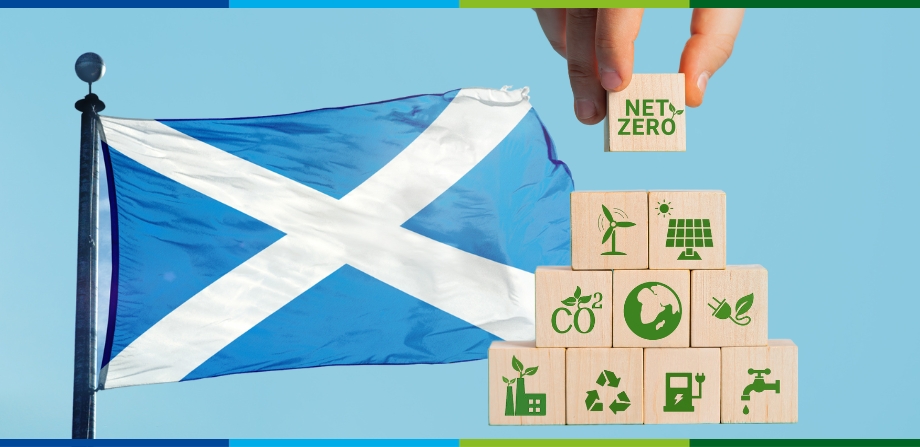- New product launch – a world-first sharps container made from healthcare waste
- 25 years of partnership celebrated with sustainability success in Northern Ireland
- Daniels Healthcare joins the UK Healthcare Pavilion at Arab Health
- Leading the world – best practice in UK healthcare
- Daniels Healthcare wins ‘Best Sustainable Product’ award at IPS 2024
Posted on by
Across the borders: How NHS Scotland is taking the lead in the race to net zero

In 2019, NHS Scotland demonstrated leadership by becoming the inaugural national health service in the UK to pledge its commitment to achieving net-zero status.
This decision reflected its recognition of the urgency to address the climate emergency and mitigate biodiversity loss.
In August 2022, NHS Scotland introduced the Climate Emergency and Sustainability Strategy 2022-2026. This strategic framework outlines five priority areas that will guide their efforts to attain net-zero emissions by 2040 and establish an environmentally and socially sustainable healthcare service.
Scotland has recently become the first part of the UK to stop using an anaesthetic gas in the NHS which has a global warming potential 2,500 times greater than carbon dioxide.
Desflurane is used as an anaesthetic during surgery and removing it from use in operating theatres across NHS Scotland has the potential to save emissions equivalent to powering 1,700 homes every year, the Scottish Government said.
Trusts vs boards
Scotland’s NHS was created at the same time as NHS England, NHS Northern Ireland and NHS Wales in 1948 via the National Health Service Act with all providing free healthcare to residents.
In England, the NHS is organised into Trusts that serve specific geographical areas. The structure differs in Scotland which has a system of fourteen regional entities known as Health Boards. These oversee the provision of healthcare services within their respective regions.
Daniels Healthcare is a sharps and clinical waste container supplier for all fourteen Health Boards including three Special Health Boards:
- Golden Jubilee University National Hospital – a special NHS Board in Scotland with the purpose of reducing waiting times using a single modern hospital located at Clydebank.
- State Hospitals Board for Scotland – responsible for the secure psychiatric hospital at Carstairs.
- NHS National Services Scotland – the common name for the Common Services Agency providing services for NHS Scotland boards.
Sustainability successes
It is estimated that NHS Scotland is responsible for around 5% of Scotland’s carbon footprint. The way that care is provided influences environmental impacts and greenhouse gas emissions.
NHS Scotland has developed a National Sustainability Assessment Tool which all Health Boards use on an annual basis to measure their progress across sixteen different areas of sustainability.
Daniels Healthcare champions a joined-up approach and support our customers in achieving their own sustainability goals, through consultation, training and continuous auditing to ensure compliance. There has been some great progress and Daniels Healthcare is working closely with the Boards to support their waste management, carbon reduction and plastic reduction targets which includes the provision of containers made from recycled plastic.
Here are just a few examples of the great work that our customers are doing to become more sustainable.
NHS Lanarkshire
NHS Lanarkshire has a dedicated Sustainability and Environmental Team which recently won an award at the NHS Assure Awards in recognition for the excellent partnership work undertaken by the Lanarkshire Green Health Partnership.
Since monitoring and reporting of national energy and emissions targets began in 1990, NHS Lanarkshire has reduced emissions by 74% against the Scottish Government target of 75% nine years ahead of the 2030 target date.
NHS Lanarkshire has recently submitted a planning application to North Lanarkshire Council to build what will be Scotland’s first fully digital and net zero carbon hospital.
NHS Tayside
NHS Tayside made successful funding applications for £1.1million via the Scottish Government’s Green Public Sector Estate Decarbonisation Scheme to invest in the energy efficiency projects, including the installation of LED lighting across five sites. Other work includes installing new heating controls and replacing pumps and motors to more efficient versions that can be better controlled.
The projects are expected to save over 1,600 tonnes of CO2 annually and costs of £1.2 million a year will also be avoided through lower electricity and gas bills. The improvements are also expected to lead to reduced maintenance costs in future years.
NHS Shetland
As part of NHS Shetland’s commitment to sustainability, a fleet of new electric vehicles have hit the road, helping staff get around the isles while also cutting the Board’s carbon footprint.
A total of 24 MG4 vehicles have been phased in to replace the former fleet, taking the Board’s overall total electric car fleet to 35. 22 electric vehicle charging points have also been installed to ensure the fleet can recharge when required.
NHS Western Isles
Rural, island communities face unique challenges and islands like the Western Isles are more vulnerable to the impacts of the climate emergency, but progress has been made in many areas at NHS Western Isles.
Reductions in energy usage have already been achieved and NHS Western Isles is currently working with an engineering firm to explore Net Zero route maps for their three biggest energy consuming properties.
LED lights, new steam boilers with economisers, and more efficient air handling units are being installed across the estate. And as part of a new Food Waste Strategy, food waste has also been reduced with 50% now being sent to the local anaerobic digester and used to generate electricity and hydrogen.
Patient care and carbon reductions go hand-in-hand
NHS Scotland has recognised the importance of reducing its carbon footprint and addressing environmental challenges and Health Boards up and down the country have made commitments to promoting sustainable practices within its operations and infrastructure.
It’s fantastic to see the dedication and great strides already made to minimise the environmental impact of healthcare delivery while healthcare teams continue to ensure the provision of high-quality patient care. Well done to everyone involved and we look forward to hearing about your next sustainability initiatives and progress soon.
Take a look at some of the other recent successes at a selection of NHS Scotland’s Health Boards.
NHS Greater Glasgow and Clyde
NHSGGC has declared a climate emergency and teams across the organisations are progressing a change and improvement agenda for sustainability and climate change to ensure delivery of the outcomes aligned to the UN Sustainable Development Goals, and NHS Scotland’s target of being Net Zero by 2040.
Two members of NHS Greater Glasgow and Clyde’s Sustainability Team have recently had their work fighting climate change recognised by one of Scotland’s leading universities. Glasgow Caledonian University (GCU) has paid tribute to Martin Johnston and Kirsten Allan for their work in driving forward sustainability efforts at Scotland’s biggest health board in the push to Net Zero.
NHS Forth Valley
The first NHS Forth Valley’s Annual Climate Emergency and Sustainability report shows big improvements in a number of key areas.
Emissions in have been cut by a third and a number of other initiatives are reporting good progress in tackling the climate emergency such as electric vehicle charging point installations, access to electric bikes, and bike maintenance schemes to help staff switch to more sustainable ways of travelling.
NHS Borders
In addition to health benefits for patients and staff, investment in greenspace around hospitals and healthcare centres helps tackle climate change and biodiversity loss.
NHS Borders has implemented a series of greenspace and increase biodiversity within its grounds and gardens including:
- Reducing the number of cuts on its large areas of grassland per year from approximately 16 to 10 whilst increasing the height of cut of these areas to 75mm.
- Increasing the number of areas within all NHS Borders grounds that are planted with new pollen rich planting and wildflowers.
- Recycling green waste.
- Supporting the “Space to Grow” project at Huntlyburn House – an area is used for carrying out workshops that assist in the rehabilitation of mental health patients.
- Embedding biodiversity principles into all estate planning and management including minimising the use of pesticides across the estate.
NHS Lothian
Anaesthetic gases have a significant impact on the environment and account for around 5% of the overall carbon footprint of health services.
Desflurane and Nitrous Oxide are two of the most environmentally harmful gases used in operating theatres, with Desflurane having a global warming potential 2,500 times greater than carbon dioxide.
NHS Lothian’s Western General Hospital has significantly reduced its carbon emissions by replacing the use of one medical gas alone with an eco-friendlier alternative. The Department of Anaesthetic’s carbon footprint has decreased by over 125 tonnes annually (a 73% reduction in the carbon emissions of their anaesthetic gases).








